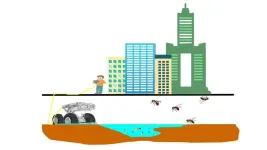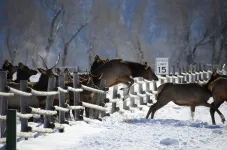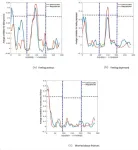(Press-News.org) To help solve hunger and malnutrition while also slowing climate change, some farmers could shift from land to sea, suggests a recent study from the Friedman School of Nutrition Science and Policy at Tufts University. The study was published in Global Food Security.
Producing and selling seaweed could boost incomes for farmers in low- and middle-income countries (LMICs), particularly in coastal regions of Africa and Southeast Asia, said Patrick Webb, the Alexander McFarlane Professor of Nutrition at the Friedman School and senior author of the study. The other authors were Natalie Somers, N23, and Shakuntala Thilsted, who works for the Consultative Group on International Agriculture Research and won a 2021 World Food Prize for research and innovation in aquaculture and food systems. The team reviewed research papers, existing databases, United Nations and World Bank Group reports, and more.
A more sustainable alternative to raising livestock, seaweed cultivation requires no land, freshwater, or chemical fertilizers, and could become particularly profitable as demand for nutrient-rich seaweed products grows around the world, the study found. Those profits would mean more buying power for those households and communities who produce, process, package, and export the microalgae, which in turn would translate into healthier diets.
“One of the biggest problems of food insecurity in LMICs is the unaffordability of healthy diets,” said Webb, who also serves as director for the Food Systems for Nutrition Innovation Lab at Tufts. “There are roughly 3.5 billion people in the world who can’t afford a healthy diet even if they choose local foods at local prices. For many of those people, cultivating and selling seaweed would lead to higher incomes and improved nutrition through purchases on the market.”
Easy and environmentally friendly
A friendly crop for both farmers and the environment, seaweed has been grown in parts of Asia for centuries using fairly simple techniques, according to the study.
To start, farmers attach long lines of rope to the roots of the algae, which nourish the plant by absorbing nutrients from the water. Six to eight weeks later, they gather the seaweed by hand and dry it in the sun. “A lot of what we're looking at on the farming side is not about finding new crops or different kinds of crops. It’s about what’s already being grown that could be scaled up cost-effectively,” Webb said.
On top of being relatively easy to grow, seaweed has a miniscule carbon footprint, and may even help lower the ocean’s carbon levels. Though little is yet known about how much CO2 seaweed releases during harvest, research has found that perennial brown algae farms absorb up to ten tons of CO2 per hectare of sea surface per year. In addition to its “carbon sinking” powers, when added to livestock feed, seaweed could help dramatically reduce methane gas emissions.
“Unless we get significant warming of the oceans, cultivating seaweed offers a way that is not just climate friendly, but climate proof,” said Webb. “We don’t know how soon the industry will start to experience the negative effects of climate change, but the potential looks good. By farming seaweed, it’s not going to accelerate those negative effects. Whereas cutting down trees and adding more livestock certainly would.”
The challenges of production and processing
But while seaweed farming helps the environment, climate change itself may present barriers to growing more of it. Ocean water is becoming increasingly acidic, which is not ideal for growing healthy, edible seaweed, the authors said.
Additionally, seaweed’s primary value as an export would be for its extracts as ingredients, rather than as a sea vegetable to be eaten whole, according to the study. And while countries with higher average incomes that produce and export brown, green, and red seaweeds in large quantities already have the infrastructure needed to effectively process, test, and regulate what may eventually land on consumers’ plates, most LMICs do not.
Research into processing bottlenecks is limited, and what little data exists on factors such as consumer patterns is owned by the food companies who collect it, Webb said—which means governments and entrepreneurs in many LMICs have had few resources or incentives to invest in aquatic plant farming.
“The steps taken between the farm and the fork, that’s what we need to focus on,” Webb said. “We need to work more closely with governments and the private sector to figure out where the bottlenecks are and how to overcome them.”
A bounty for the taking
If those obstacles can be addressed, the opportunities of seaweed aquaculture are boundless, the authors said. The industry has flourished in Indonesia, where seasonal labor is steadily available and farms can achieve industrial-level economies of scale (in contrast to the family-run farms of, for example, India and Tanzania). Indonesia is now a key exporter of two seaweed species from which carrageenan, a thickener found in nut milks and meats, is extracted.
“There are many different types of seaweed, and they all require somewhat of a different environment in which to grow. The vast coasts of Africa and Asia, not all of it will be prime real estate,” Webb said. "But much of it will be.”
For seaweed farming to expand in these places, governments must take it seriously and create food safety regulations and an overall environment where it can happen, Webb said. Local and international investment interest will also be key. “If it doesn’t happen tomorrow, with the right conditions, it could happen the day after tomorrow,” Webb said.
It’s early days for seaweed production in LMICs, but Webb is confident about its promise for farmers. “The Ministry of Agriculture, or even the Ministry of Fisheries in these countries probably never discusses seaweed,” he said. “What if they did? They might discover a goldmine.”
The lead author received financial support from the United States Agency for International Development as part of the Feed the Future Food Systems for Nutrition Innovation Lab. The content is solely the responsibility of the authors and does not necessarily represent the official views of the United States Agency for International Development.
END
Seaweed farming may help tackle global food insecurity
Researchers at the Friedman School see significant income-boosting potential in the sustainable superfood
2023-06-08
ELSE PRESS RELEASES FROM THIS DATE:
Pritzker Molecular Engineering researchers “split” phonons – or sound – in step toward new type of quantum computer
2023-06-08
When we listen to our favorite song, what sounds like a continuous wave of music is actually transmitted as tiny packets of quantum particles called phonons.
The laws of quantum mechanics hold that quantum particles are fundamentally indivisible and therefore cannot be split, but researchers at the Pritzker School of Molecular Engineering (PME) at the University of Chicago are exploring what happens when you try to split a phonon.
In two experiments – the first of their kinds – a team led by Prof. Andrew Cleland used a device called an acoustic beamsplitter ...
Robotic vehicles fight dengue-carrying mosquitos in Taiwan sewers
2023-06-08
Unmanned ground vehicles can be used to identify and eliminate the breeding sources of mosquitos that carry dengue fever in urban areas, according to a new study published this week in PLOS Neglected Tropical Diseases by Wei-Liang Liu of the Taiwan National Mosquito-Borne Diseases Control Research Center, and colleagues.
Dengue fever is an infectious disease caused by the dengue virus and spread by several mosquito species in the genus Aedes, which also spread chikungunya, yellow fever and zika. Through the process of urbanization, ...
Reversing age-related taurine loss via supplementation improves mouse longevity and monkey health
2023-06-08
Taurine deficiency may be a driver for aging, according to a new study, which evaluated the amino acid’s effect on health and longevity across several animal models. According to the authors, reversing age-associated taurine loss via supplementation improved the healthy lifespan in worms, rodents, and non-human primates – findings that warrant further human trials to examine taurine’s effect on healthy lifespan in humans and the potential risks involved. Taurine – a semi-essential micronutrient – is one of the most abundant amino acids in animals. Previous studies in several species have shown that taurine deficiency during early life causes functional ...
2020’s COVID-19 lockdowns altered mammal movements worldwide
2023-06-08
Reduced traffic and human mobility during the 2020 COVID-19 lockdown restrictions rapidly altered some mammals’ movement behaviors, according to a new study. The findings illustrate how human activities constrain animal movement and how they react when those activities cease, which provides valuable insight into future conservation strategies designed to improve human-wildlife coexistence. During the initial global outbreak of COVID-19 in 2020, governments worldwide introduced lockdown measures to curb the spread of the virus, resulting in a drastic reduction in human mobility and vehicular traffic. This “anthropause,” as it’s come to be known, ...
Some intestinal T cells can hinder cancer immunotherapy, while others can enhance it, finds a new pair of studies
2023-06-08
Two new studies in Science and Science Immunology spotlight a group of intestinal T cells with α4β7 integrin receptors that could be targeted to prevent resistance to immune checkpoint blockade (ICB) cancer immunotherapy. Both studies were conducted in mice and corroborated in samples from patients.
In the Science study, Marine Fidelle and colleagues evaluated how interactions between antibiotics, the gut microbiome, and α4β7+ CD4+ T cells promote ...
Climate underlies African forest and savanna biomes
2023-06-08
Coupled field observations and phytoclimatic modeling show that the distribution of African forest and savanna ecosystems are highly predictable by climate, researchers report in a new study. The findings suggest that the effects of climate change on the distribution of African forests and savanna may be more easily forecasted than previously recognized. An important yet challenging goal for ecological science is predicting how global vegetation patterns will be altered by ongoing climate change. Generally, the distribution of Earth’s vegetation biomes is determined by climate. However, at local or regional ...
Wild mammals moved farther during severe COVID-19 lockdowns
2023-06-08
Tucker and 174 colleagues, including members of the COVID-19 Bio-Logging Initiative, analysed global data from land mammals tracked by GPS devices. Tucker: “There were many media reports that nature was recovering during those first lockdowns. For example, cougars were roaming the streets of Santiago, Chile, but we wanted to know: is there any evidence of this? Or were people simply paying more attention to everything while being at home?”
Movements of mammals
Tucker and colleagues collated ...
Study: Southern states may have borne brunt of COVID-19 mental health impact
2023-06-08
LAWRENCE — A new study appearing today in the peer-reviewed journal PLOS ONE shows how federal and state lockdowns and health mandates implemented to curb the spread of COVID-19 affected the mental health of people living in four U.S. geographic regions and affiliated with two major political parties.
A group of faculty, staff and student researchers at the University of Kansas generated data-based maps to look for spatial trends and communities with similar mental health and COVID-19 outcomes. ...
Researchers find an immune system ‘trip wire’ that detects COVID-19
2023-06-08
Inflammasomes make up an intricate system of molecular sensors that our bodies use to sound an alarm when an infection occurs. However, the mechanisms behind these sensors, which initiate responses to threats such as invading pathogens, and how they operate has been an area of intrigue for immunologists.
In a new study, University of California San Diego biologists describe a previously unknown way that the immune system detects certain viruses. The inflammasome immune protein known as CARD8, they found, can serve as a trip wire to detect a range of viruses, including SARS-Cov-2, which causes COVID-19.
Adding ...
Without fully implementing net-zero pledges, the world will miss climate goals
2023-06-08
Without more legally binding and well-planned net-zero policies, the world is highly likely to miss key climate targets.
In the new study, led by Imperial College London and published today in Science, researchers ranked 90% of global net-zero greenhouse gas emissions pledges as providing low confidence in their full implementation.
The researchers recommend nations make their targets legally binding and back them up with long-term plans and short-term implementation policies to increase the likelihood of avoiding ...
LAST 30 PRESS RELEASES:
New knowledge on heritability paves the way for better treatment of people with chronic inflammatory bowel disease
Under the Lens: Microbiologists Nicola Holden and Gil Domingue weigh in on the raw milk debate
Science reveals why you can’t resist a snack – even when you’re full
Kidney cancer study finds belzutifan plus pembrolizumab post-surgery helps patients at high risk for relapse stay cancer-free longer
Alkali cation effects in electrochemical carbon dioxide reduction
Test platforms for charging wireless cars now fit on a bench
$3 million NIH grant funds national study of Medicare Advantage’s benefit expansion into social supports
Amplified Sciences achieves CAP accreditation for cutting-edge diagnostic lab
Fred Hutch announces 12 recipients of the annual Harold M. Weintraub Graduate Student Award
Native forest litter helps rebuild soil life in post-mining landscapes
Mountain soils in arid regions may emit more greenhouse gas as climate shifts, new study finds
Pairing biochar with other soil amendments could unlock stronger gains in soil health
Why do we get a skip in our step when we’re happy? Thank dopamine
UC Irvine scientists uncover cellular mechanism behind muscle repair
Platform to map living brain noninvasively takes next big step
Stress-testing the Cascadia Subduction Zone reveals variability that could impact how earthquakes spread
We may be underestimating the true carbon cost of northern wildfires
Blood test predicts which bladder cancer patients may safely skip surgery
Kennesaw State's Vijay Anand honored as National Academy of Inventors Senior Member
Recovery from whaling reveals the role of age in Humpback reproduction
Can the canny tick help prevent disease like MS and cancer?
Newcomer children show lower rates of emergency department use for non‑urgent conditions, study finds
Cognitive and neuropsychiatric function in former American football players
From trash to climate tech: rubber gloves find new life as carbon capturers materials
A step towards needed treatments for hantaviruses in new molecular map
Boys are more motivated, while girls are more compassionate?
Study identifies opposing roles for IL6 and IL6R in long-term mortality
AI accurately spots medical disorder from privacy-conscious hand images
Transient Pauli blocking for broadband ultrafast optical switching
Political polarization can spur CO2 emissions, stymie climate action
[Press-News.org] Seaweed farming may help tackle global food insecurityResearchers at the Friedman School see significant income-boosting potential in the sustainable superfood


